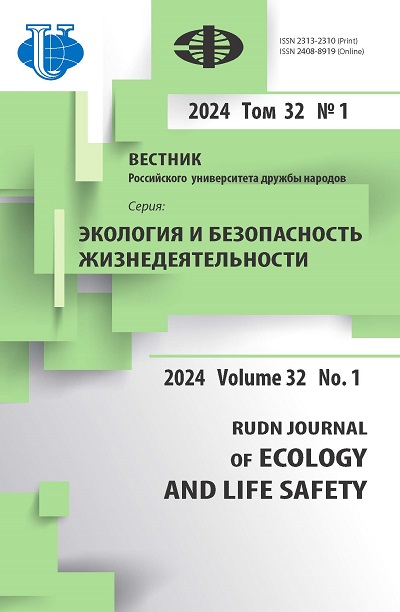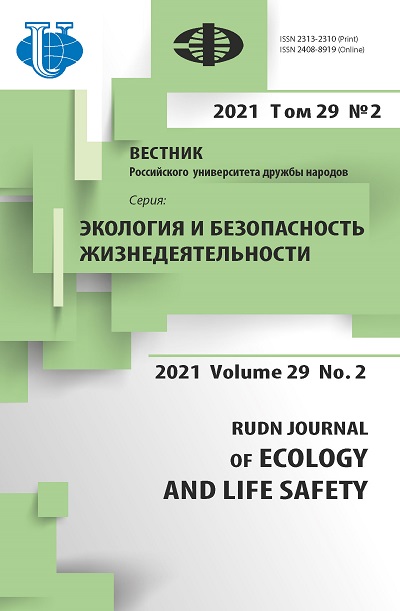Purification of wastewater of industrial enterprises from phenols by modified energy waste
- Authors: Nikolaeva L.A.1, Aikenova N.E.1, Demin A.V.1
-
Affiliations:
- Kazan State Power Engineering University
- Issue: Vol 29, No 2 (2021)
- Pages: 174-181
- Section: Industrial Ecology
- URL: https://journals.rudn.ru/ecology/article/view/30030
- DOI: https://doi.org/10.22363/2313-2310-2021-29-2-174-181
Cite item
Full Text
Abstract
With the development of engineering and technology, industrial enterprises have an increasing impact on the environment. One of the problems of our time is the pollution of water bodies with industrial toxic waste. Innovative in the field of environmental protection are methods of using inexpensive adsorbents for wastewater treatment, where cost factors play a major role. For quite a long time, an urgent task has been the development of inexpensive adsorbents that can be alternative to those existing at wastewater treatment facilities. Inexpensive alternative adsorbents can be obtained from a wide range of raw materials that are abundant, cheap, and highly absorbent. The article discusses the possibility of purification of industrial wastewater from phenols of oil refining industries on the example of LLP “Aktobe Oil Refining”. In the treatment of industrial wastewater, the method of adsorption treatment is widely used, which allows not only to purify from pollutants to maximum permissible concentrations (maximum permissible concentrations), but is also cost-effective when introduced. Economic efficiency is characterized by the use of industrial waste as adsorption materials, which in turn show high cleaning efficiency and resolve the issue of disposal of production waste. In this work, energy waste is used as an adsorption material - carbonate sludge from the chemical water treatment of the Aktobe TPP. To achieve a high degree of purification from pollutants, a modified carbonate sludge was obtained, which is used as an adsorption material in filters. A method for obtaining modified carbonate sludge from chemical water treatment is considered. A basic technological scheme of wastewater treatment from phenols has been proposed, a sorption filter for wastewater treatment with a filler - modified carbonate sludge has been selected and calculated. To implement the technology of purification of wastewater from phenols, the economic efficiency and the prevented environmental harm were calculated using the example of the enterprise LLP “Aktobe Oil Refining”. The technology of regeneration of waste carbonate sludge is considered. The heat effects of combustion of spent carbonate sludge as a fuel material are calculated using the example of Aktobe TPP.
About the authors
Larisa A. Nikolaeva
Kazan State Power Engineering University
Author for correspondence.
Email: larisanik16@mail.ru
Doctor of Technical Sciences, Professor of the Department “Technologies in Energy and Oil and Gas Processing”
51 Krasnoselskaya St, Kazan, 420066, Russian FederationNuriya E. Aikenova
Kazan State Power Engineering University
Email: twrpx99@mail.ru
postgraduate student, Department “Technologies in Energy and Oil and Gas Processing”
51 Krasnoselskaya St, Kazan, 420066, Russian FederationAlexey V. Demin
Kazan State Power Engineering University
Email: alexei_demin@mail.ru
Doctor of Technical Sciences, Professor of the Department “Engineering Ecology and Labor Safety”
51 Krasnoselskaya St, Kazan, 420066, Russian FederationReferences
- Sun X, Wang C, Li Y, Wang W, We J. Treatment of phenolic wastewater by combined Uf and Nf/Ro processes. Desalination. 2015;355:68–74.
- Franz M, Arafat HA, Pinto NG. Effect of chemical surface heterogeneity on the adsorption mechanism of dissolved aromatics on activated carbon. Carbon. 2000;38:1807–1819.
- Aikenova NE, Nikolaeva LA. Purification of industrial wastewater from phenols. Problems of Contemporary Science and Practice. Vernadsky University. 2019;(3(73)):9. (In Russ.)
- Laptev AG. Models of the boundary layer and calculation of heat and mass transfer processes. Kazan: Publishing House of Kazan University; 2007. (In Russ.)
- Larin BM. Fundamentals of mathematical modeling of chemical-technological processes of processing coolant at thermal power plants and nuclear power plants. Moscow: MPEI Publ.; 2000. (In Russ.)
- Lupeyko TG, Bayan EM, Gorbunova MO. Research of technogenic carbonate-containing waste for purification of water solutions from nickel ions (Ni)]. Russian Journal of Applied Chemistry. 2004;(2):87–91. (In Russ.)
- Nikolaeva LA, Golubchikov MA. Purification of industrial wastewater from petroleum products by modified sorption materials based on carbonate sludge. Water Supply and Sanitary Technique. 2016;(11):50–57. (In Russ.)
- Vladimirova AI, Remizova VV. (eds.) Ecology of the oil and gas complex. Moscow: Neft’ i Gaz Publ.; 2013. (In Russ.)
















